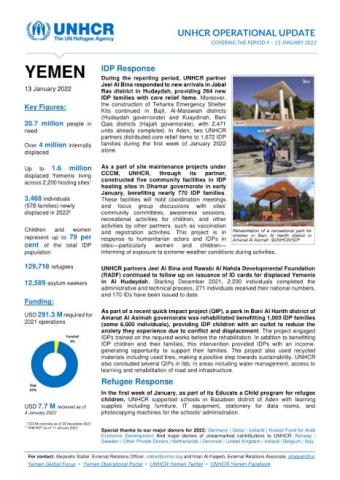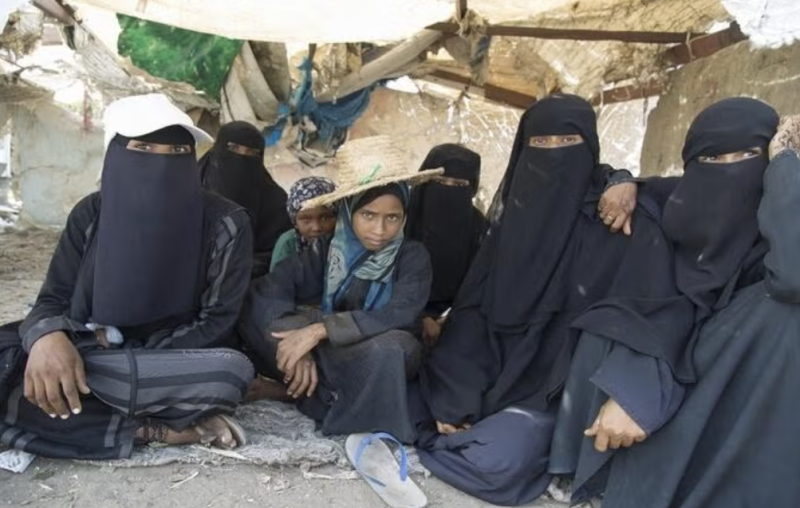Yemeni refugees recall nightmare trek through mountains with injured baby


“Helplessly watching my child bleeding was the hardest moment in my life. I wished I had died rather than see her in such a heartbreaking condition,” said Ali Ahmed Al Homaikani, who recently fled his home in Al Zaher district in the province of Al Bayda in central Yemen.
Houthi rebel militias tightened their grip over the area following fierce clashes with pro-government forces in July, he told The National.
Mr Al Homaikani fled his home with his wife and their only child — 18-month-old Hind Ahmed, who had been shot in her hand.
The couple and their wounded little girl faced an unbearable journey during which they sought shelter in Yafea, southern Yemen, before heading to Aden, where they are staying at a relative's house.
“We decided to leave the village as the Houthi troops controlled the outskirts and when we were gearing up to leave the house, my kid was shot and a bullet penetrated her hand,” Mr Al Homaikani told The National.
“We crossed valleys and mountains, walking on foot with our wounded little kid for more than three hours without any water or food,” he said.
The family were among at least 800 others that had to flee their homes following the Houthi takeover in Al Bayda in July.
Many travelled on foot to southern provinces including Lahj, Aden and Shabwa, which are under firmer government control.
Authorities say more than 200 families residing in Al Souma'a, Natea and Naman fled to Bayhan district in Shabwa province, where they are being hosted by locals.
“Meanwhile, more than 650 families residing in Al Zaher were displaced to Yafea in Lahj province and some were displaced to Aden,” Mohammed Al Wehaishi, manager of the pro-government Social Affairs Office in Al Bayda, told The National.
“Some families spent days sleeping in the open as they were stranded in valleys and mountainous terrain before they arrived in Yafea,” Mr Al Wehaishi said.
Cramped conditions
In Aden, Rashid Al Homaikani has a modest house with three rooms in the Dar Saad area, but he’s now hosting nine displaced families because no camps for the internally displaced have been set up nearby, either by the government or humanitarian organisations.
“There are nine families with a total of 56 people hosted in my rented house and I still receive new [internally displaced people] who want to sleep in the house for a night or two until they find shelter,” Mr Al Homaikani told The National.
Following the July takeover of the province, Houthi rebels raided dozens of residences in Al Bayda, rigging houses with bombs that were owned by rivals and destroying them, detaining some residents and forcibly displacing others, Mr Al Wehaishi said.
“They blew up some residences in Al Zaher district, including a house owned by a citizen called Hussien Saleh Al Barmani, by rigging it with TNT, which caused big damage to the neighbouring houses,” Mr Al Wehaishi explained.
Human rights groups have sent an urgent call for the Yemeni government, the UN and humanitarian NGOs to help to alleviate the suffering of refugees from the war in Al Bayda.
“Such an urgent response is needed to help hundreds of families live in dignity,” Anis Al Shoureik, chairman of Al Rased Organisation for Human Rights, a local INGO operating from Aden, told The National.
“Providing these people with shelter, life-saving supplies, clean water and medication is very urgent because most of these families barely escaped the war zones, taking nothing with them from their houses,” Mr Al Shoureik said.

Saudi Arabia welcomed the agreement signed on Tuesday, December 23, 2025, in Muscat, Oman, between the internationally recognized Yemeni government…

By/April Longley Alley* Among the broader regional repercussions of the Gaza ceasefire in October, one of the most signifi…

Al-Hodeidah – Local sources in Yemen’s Al-Hodeidah province have disclosed that Houthi militias are resorting to new methods of exploit…